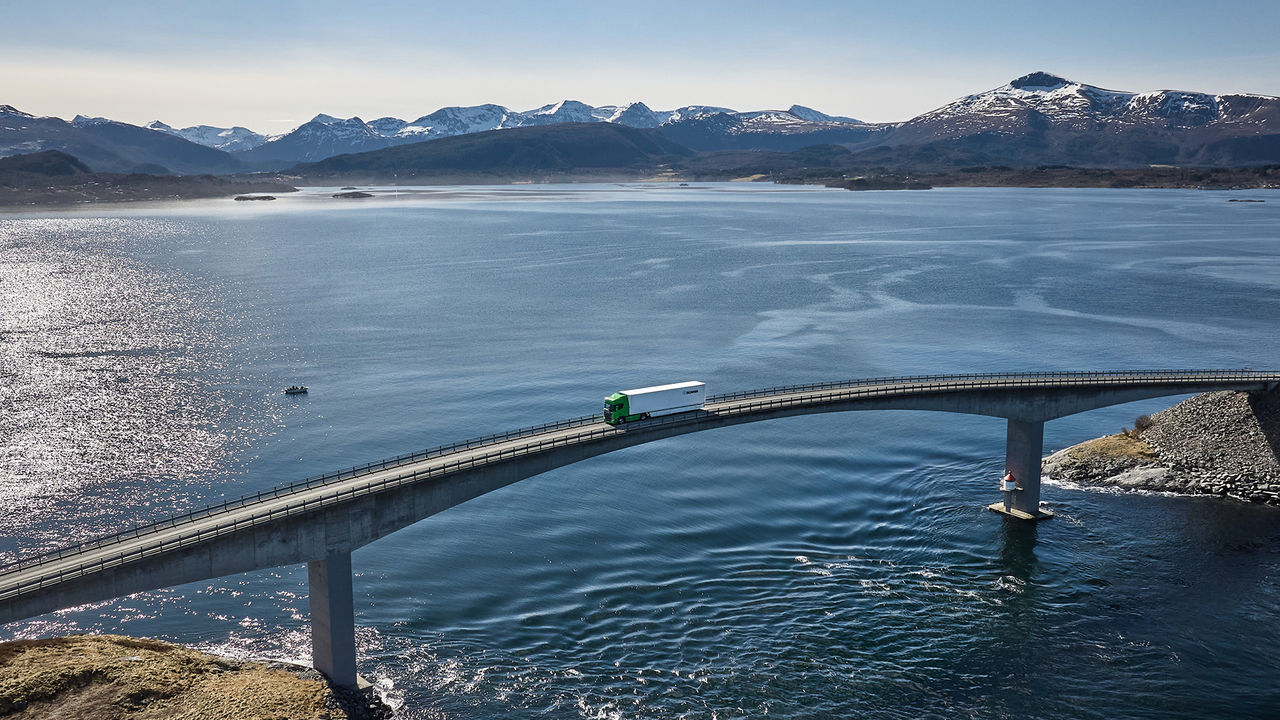
Decarbonisation
Scania’s commitment to decarbonisation is reflected in our focus on helping our customers, our company and our value chain achieve carbon-emission reductions.
We acknowledge that the transition to sustainable transport means customers having to navigate a whole new set of complex issues and business uncertainties. We offer solutions that reflect the particular business and regulatory environments where you are located. We will also tailor those solutions to your company’s specific needs, helping you to make sustainability and profitability go hand-in-hand.
As a customer using Scania’s products and services, you can be assured that we will support you every step of the way on your journey to sustainable transport. Decarbonisation is a vital challenge that requires partnership. We are better together.
Our solutions for decarbonisation
Scania’s solutions offering spans a wide range of products and services that will support customers on their decarbonisation journey. This includes internal combustion engines offering unrivalled fuel efficiency, renewable fuels, electric vehicles and smart digital tools and infrastructure that support emissions reduction, as the following categories explain.
Scania Super
We need to act now to reduce our impact on climate change by cutting CO2 emissions using all the tools and solutions available. That’s why the Scania Super, an internal combustion engine, is so important. Offering industry-leading emissions control and fuel savings of 8%, it is our most advanced and efficient combustion-engine powertrain ever, and addresses the gaps in the market while being a significant stepping stone on the way to decarbonisation.
Renewable fuels
Renewable fuels are another element of the decarbonisation toolkit and can go a long way to reducing carbon emissions. Scania has the largest portfolio of engines on the market that can run on alternatives to fossil fuels such as biodiesel, HVO and liquefied or compressed biogas.
Battery electric vehicles
Europe and parts of Asia are leading the way in the global adoption of electric vehicles. Scania has invested heavily in electrification technology, developing a range of electric vehicles and creating a charging ecosystem and digital services to support and encourage customers to go electric. Battery electric vehicles are well-suited to many city-based applications such as delivery and collection or commuter transport, although the scope of uses is expanding all the time as charging range increases.
Services 360
Services 360 offers four different service and maintenance packages based on Scania’s digital tools and services and data-driven predictive maintenance capabilities. Providing repair and maintenance coverage as an alternative to investing in in-house repair and maintenance capabilities means customers spend less time doing manual tasks. By lengthening service intervals and ensuring the vehicle efficient operates, Services 360 can contribute to reducing emissions.
Inspiring stories from our customers
In 2020, we adopted science-based climate targets. We wanted not only to hold ourselves accountable for addressing the emissions that contribute to climate change, but also to set an example and inspire change across our sector.
Biodiesel trucks bring decarbonised transport to Kenya
In East Africa, DHL Supply Chain has collaborated with Scania Kenya to introduce 25 Euro 5 biodiesel-powered trucks for its operations, a first-of-its-kind initiative in the region.
Super decarbonisation effort by Singapore transport company
In 2023, SNL Logistics, a freight forwarding company in Singapore, made a strategic decision to improve its operations by acquiring 16 Scania Super trucks. Just four months after introducing the Super to their operations, SNL recorded up to 15% reduction in fuel consumption, and significantly reduced carbon emissions.
Incredible fuel efficiency
Swedish haulier Herbert Ulfheim Fjärrtransport saw a striking reduction in its fuel bills when it added the new 13-litre Scania 560 S truck to its fleet. At first, the company thought the lower fuel consumption figures were a mistake, but checks confirmed that they were using 33 litres per 100 kilometres, some six to seven litres less than comparable trucks from elsewhere.
Biogas buses that run on recycled waste
Moventis, the public transport operator for the Spanish city of Pamplona, began integrating biogas-powered Scania buses into its fleet back in 2022. The biomethane fuel that powers its growing alternative fuel vehicle stable is produced from the city’s own waste water.
700 km round-trip on liquefied gas, with no refuelling
A Scania Irizar coach built on Scania’s newest liquefied gas platform, running on biogas, natural gas, or both, plies the 700 km daily round trip between the Swedish city of Karlstad and Stockholm’s Arlanda Airport without refuelling.
Recycling company turns to Scania for electric compacting truck
Swedish waste management service company Renall uses a battery-electric compactor truck from Scania to collect plastic bottles and aluminium cans from stores – meaning they can decarbonise and recycle at the same time.
Nagel monitors and controls its charging power with Scania’s help
Swedish Germany-based Nagel Group, one of Europe’s largest food logistics operators, is benefiting from a complete e-mobility solution from Scania, including electric trucks as well as charging infrastructure. Scania analysed the company’s payload, topography, start-and-stop-frequency, temperature, speed of vehicle and standstill time, meaning the customer can monitor and control the charging power.
Scania’s pay-per-use model cushions investment risks
We can also help customers make the transition to electrification in other ways apart from purchasing outright. One example is JUNA, a joint venture partnership solution developed by Scania and sennder, which gives customers access to electric trucks on a pay-per-use basis, thereby removing the financial risks of full ownership.